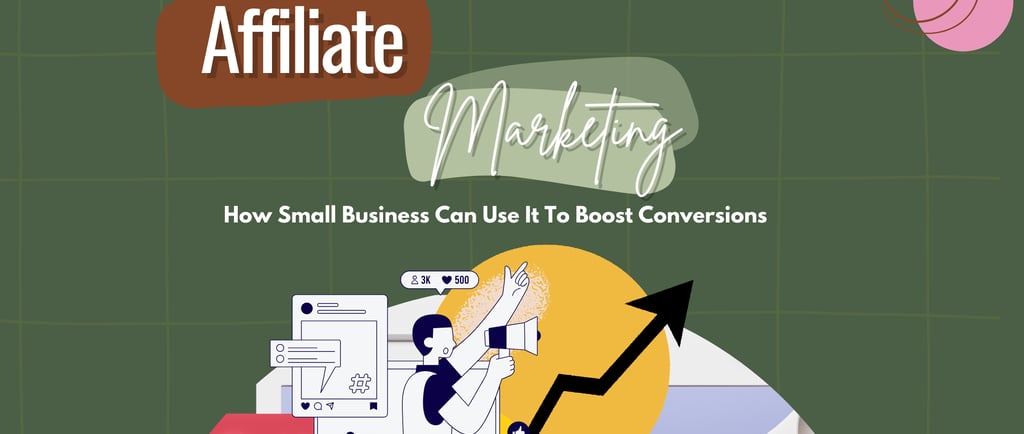How Small Businesses Can Use Affiliate Marketing To Boost Its Clicks And Conversions
3 min read


If you've googled 'top ways to make money online or something similar, you may already have come across the term 'affiliate marketing somewhere. And if you're not very sure what it means, how it works, or if it's even a practical way to earn money, then you're at the right place. in this article, I'm going to help you understand what it is, and the pros and cons of creating affiliate marketing. With that said, let's dive in.
What is AFFILIATE MARKETING?
Imagine you found this high-tech product that works like a charm. let's say that the product you found stops all insects from coming into your house. It's by far the best product you've found on the market - it has noise, no sound, no smell, and no side effects on your body. you love that product. how likely are you to tell your friend who also has a bug problem in their own home about the product? Very likely.
Now, if you found out that you could earn a percentage for each product that was bought through you? you'll probably be more motivated to tell more than just a couple of people about it. this is basically how affiliate marketing works.
It helps you earn some extra cash by telling people about a product and getting some sales while helping your friend solve their problem (if it's a great product), and helping the business make more sales. that's what you call a triple win. affiliate marketing is simply promoting someone else's product in exchange for a commission. this is usually done by assigning each affiliate with their unique link ID.
This way, anyone who clicks on the link will automatically be credited to you (both you and the company will be able to track and confirm the number of leads that are coming from your unique URL).
How Affiliate Marketing Can Drive More Clicks and Conversions
When implemented strategically, affiliate marketing can boost your traffic and sales in several ways:
1. Expanding Your Reach with Trusted Voices
Affiliates often have dedicated audiences who trust their recommendations. When they promote your product, their followers are more likely to engage and convert.
2. Creating High-Quality Referral Traffic
Unlike generic ad clicks, affiliate-driven traffic is often more targeted. Affiliates promote your business to audiences that are already interested in your niche, increasing the likelihood of conversions.
3. Enhancing SEO Through Backlinks
Affiliate content often includes backlinks to your website, improving your search engine rankings over time. This results in long-term organic traffic benefits.
4. Leveraging Performance-Based Marketing
Because you only pay affiliates when they drive a sale or lead, you can control your marketing spend and focus on high-ROI partnerships.
How to Build an Affiliate Marketing Strategy for Your Business
Ready to turn affiliate marketing into a conversion-boosting strategy? Follow these steps:
1. Define Your Goals
Determine what you want to achieve—more sales, sign-ups, or brand awareness? This will help shape your commission structure and affiliate partnerships.
2. Choose the Right Affiliate Model
Pay-per-sale: Commission for each sale made through an affiliate’s link.
Pay-per-lead: Commission for leads (e.g., email sign-ups, free trials).
Pay-per-click: Commission for each click generated to your site (less common but useful for traffic growth).
3. Find the Right Affiliates
Look for partners who align with your brand and already engage with your target audience. These could be:
Bloggers in your industry
Influencers with niche audiences
Other small businesses with complementary products
4. Provide Affiliates with the Right Tools
Make it easy for affiliates to promote your brand by offering:
Unique tracking links
High-quality visuals and banners
Exclusive discount codes for their audience
Content guidelines and sample messaging
5. Track Performance and Optimize
Use affiliate tracking software or platforms like ShareASale, Rakuten, or an in-house program to monitor performance.
Pay attention to click-through rates and conversion rates
Adjust your strategy based on what’s working.
6. Build Strong Relationships with Your Affiliates
Affiliates are an extension of your sales team. Engage with them regularly, offer incentives, and keep them updated on new products, promotions, and exclusive deals to maintain enthusiasm.
Conclusion - Start Leveraging Affiliate Marketing Today
Affiliate marketing isn’t just a tool for big brands—it’s an accessible, scalable, and cost-effective strategy that can drive traffic and conversions for small businesses. By partnering with the right affiliates, optimizing your campaigns, and continuously refining your approach, you can turn affiliate marketing into a powerful revenue generator for your business.
Not sure which fits your situation?
clicksnthings@gmail.com
© 2025. All rights reserved.
Book a free 15-minute consultation call to discuss your specific challenges.
